Matthew Yglesias's Blog, page 2402
March 3, 2011
Shifting Attitudes Toward War

I don't share Duncan Black's political pessimism about this: "We'll never get there, but I'll know that actual serious people are in charge when we seriously question just whether the proper response to a bunch of guys flying planes into buildings was a large invasion and decade-long occupation of a country none of them were actually from."
I think it's quite noteworthy that if you compare the Vietnam War to Iraq and Afghanistan combined that we've had strikingly fewer American soldiers killed and strikingly fewer foreigners killed by American soldiers. George W Bush was way to the left of Lyndon Johnson in terms of tolerable levels of devastation to hail down on other people. The events of 9/11 led to a surge in nationalist and pro-violence sentiment, but the trajectory here over decades is downward. I don't think that's a trend that will inevitably continue, but there's no particular reason to think it won't, and people should be encouraged to see this as an area in which enormous progress has been made and where more work will be rewarded with more progress.


Huckabee and the Politics of Greed
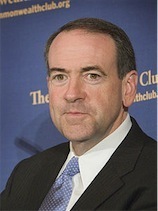
Sarah Laskow rounds up considerable evidence that Mike Huckabee . If so, that's too bad, since the kind of guy who'd pass up a presidential bid because he doesn't want to take the financial hit is exactly the kind of person we need more of in politics. That's why I always have a little bit of a soft-spot for elected officials who find ways to corruptly enrich themselves in office. At the margin, I'm comforted by the idea of more greedy elected officials and fewer power-crazed egomaniacs.
Another way of looking at this is that there's a kind of indirect political economy cost to skyrocketing inequality. Elected officials are high-status individuals, and it's natural for them to spend a lot of time talking to other high-status individuals. But the ratio of a congressman's income to the income of a person who's high-status because he's a CEO or a financier has plummeted over the past thirty years. This doesn't just suck people out of politics, I think it's actually quite psychologically distorting. If half the people you see earn 20 times as much, then you can easily start convincing yourself that a salary of $174,000 a year (plus pretty generous benefits) is actually really low. From there it's easy to see that a couple with $250,000 in household income isn't "really" rich even if some annoying blogger is trying to tell you that's five times the national median.
(As for Huckabee personally, I wonder if he's familiar with that part of the Bible about the camel and the eye of the needle)


Public Opinion Is So Gay
Excellent news from Pew:
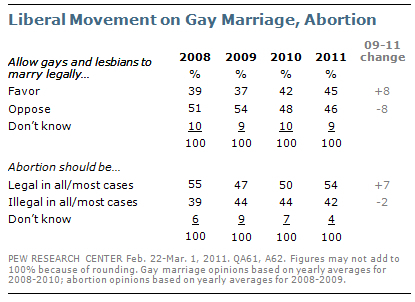
Five years ago, if there were five Supreme Court justices who believed that marriage equality should be the law of the land, they'd still probably have shied away from saying so for fear of issuing a desperately unpopular decision on a hot-button subject. Today, not so much. And with the Obama administration now saying that DOMA should be subjected to "heightened scrutiny" it would seem to follow that all forms of marriage inequity also deserve said heightened scrutiny. Consequently, I think we may actually wind up having nationwide marriage equality sooner than people think as long as Justice Kennedy continues to be sympathetic to gay equity claims.


The US Corporate Income Tax: The Food Is Bad, And The Portions Are Too Small
Excellent chart from Chuck Marr at CBPP on the corporate income tax:
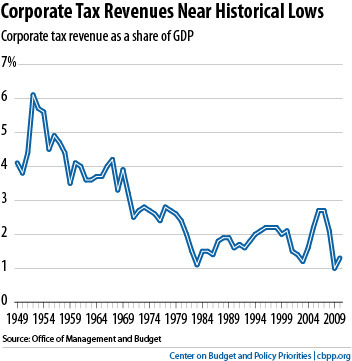
There's no particularly compelling reason to want corporate income tax revenue to be a large share of GDP, but the point highlighted here is that in a climate where the country needs more tax revenue in the medium-term, there's no reason corporate income tax reform should be strictly revenue neutral. The headline rates are so high, and yet the loopholes are so ubiquitous, that it's very easy to design reforms that are both clearly pro-growth and revenue-enhancing, even apart from the fact that deficit reduction (at the right time) can be growth-enhancing.


The Recall Drive in Wisconsin
Activists in Wisconsin have hit upon a method that coud conceivably lead to the end of the deadlock there. Several Republican State Senators are eligible for recall, and progressives in the state are going to go for it:
Under Wisconsin law, supporters of this recall effort now have 60 days to collect an amount of signatures "equal to at least 25% of the vote cast for the office of governor at the last election within the same district or territory as that of the officeholder being recalled." The amount of signatures necessary to trigger a recall will vary from district to district, but will range from about 15,000 to 21,000 signatures per recalled senator.
Via Jon Chait, here's how the eight senators' in question districts voted in 2004 and 2008:
Robert Cowles (District 2): 2004 – Bush +15%; 2008 – Obama +6%
Alberta Darling (District 8): 2004 – Bush +7%; 2008 – Obama +4%
Sheila Harsdorf (District 10): 2004 – Bush +3%; 2008 – Obama +2%
Luther Olsen (District 14): 2004 – Bush +13%; 2008 – Obama +5%
Randy Hopper (District 18): 2004 – Bush +15%; 2008 – Obama +4%
Glen Grothman (District 20): 2004 – Bush +39%; 2008 – McCain +27%
Mary Lazich (District 28): 2004 – Bush +29%; 2008 – McCain +21%
Dan Kapanke (District 32): 2004 – Kerry +7%; 2008 – Obama +23%
Only Kapanke is super-vulnerable, but Cowles, Darling, Harsdorf, Olsen, and Hopper all have something to worry about. As Chait notes, contributing money to this drive is probably "more constructive than playing guitar and eating pizza." I note that there's also the possibility that the mere threat of recall will compel some of these folks to start looking harder for compromise. Wisconsin State Senators' offices probably don't get a lot of calls from out-of-state people saying "look, I'm not the kind of person who's normally inclined to get involved in Wisconsin state politics, but I'm going to do everything in my power to beat you on this issue." Obviously a threat followed by actual money or volunteering is more useful than a bluff, but even a bluff works! The main reason we don't have more progressive public policy in this country is that progressives aren't good enough at delivering these kind of contacts and concrete political threats to real pressure points.


Texas Rep Debbie Riddle: No Undocumented Immigrants Except for The Help
Kevin Drum assures me that this is not a joke:
Under the House Bill 2012 introduced by a tea party favorite state Rep. Debbie Riddle — who's been saying for some time that she'd like to see Texas institute an Arizona-style immigration law — hiring an undocumented maid, caretaker, lawnworker or any type of houseworker would be allowed. Why? As Texas state Rep. Aaron Pena, also a Republican, told CNN, without the exemption, "a large segment of the Texas population" would wind up in prison if the bill became law.
"When it comes to household employees or yard workers it is extremely common for Texans to hire people who are likely undocumented workers," Pena told the news giant. "It is so common it is overlooked."
It certainly sounds like a joke.


You Can't Take The Train to Los Angeles, So The Runway Shouldn't Be Full of Planes To Boston
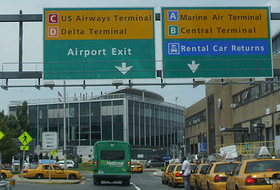
(cc photo by dougtone)
Paul Krugman blogs about trains:
Some of the comments on my various pro-train posts have been along the lines of "Oh yeah, try taking the train to Los Angeles." But that, of course, misses the point.
I endorse Krugman's analysis, but in some ways I think the fact that you can't get to LA on a train actually is the point. You can't take the train from New York to Los Angeles. You can't drive from New York to Los Angeles. You need an airplane. But LaGuardia Airport has limited runway capacity and many daily flights to Boston. Clearly, though, you can take a train from New York to Boston. So money spent on improving the speed and passenger capacity of NYC-Boston train links is, among other things, a way to improve New York's air links to the West Coast.
Now a separate question is whether there's any feasible way to actually do this in a country that doesn't have a French (or Chinese) level of central political authority empowered to build straight tracks through people's suburban backyards. The answer seems to be "no," but the potential gains from greater rail capacity in the northeast are large and would (via airplanes) spill over into the rest of the country.


Excellent News
Jackie Calmes NYT piece on Bill Daley and David Plouffe is obviously a beet-sweetener but I assume you construct these things out of accurate facts, so I was excited to read this:
Mr. Plouffe likewise is less available to reporters and party officials and keeps his office television turned off — to tune out the daily distractions of cable TV's political play by play.
I would love to see this rule more widely implemented. Cable news has a tiny audience. Daytime cable news has an even tinier audience. But it's an audience that includes lots of DC political professionals who are all fooling themselves into thinking that they're watching some kind of proxy for how things play to the public.


People Love Teachers
One of my pet ideas is that people in DC spend way too much time gazing at surveys of the public's hazy opinions on issues and not enough time gazing at surveys of what the public thinks of different kinds of people. So let me link again to this table from the latest NBC poll (PDF):
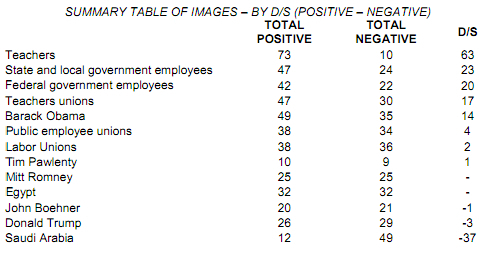
The disparate polling for "teachers," "teachers unions," and "labor unions," is telling. Among political elites, virtually everyone is more critical of teachers unions than of unions in general. But the voters like teachers a lot. So the voters' view of teachers unions is basically a mix of their feelings about teachers (strongly positive) and their feelings about unions (very mixed). Consequently, teachers unions get pretty good marks.
This is one reason why despite my sellout neoliberal views on education policy, I'm sort of sanguine about teachers unions. Current education policy over-weights the interests of incumbent teachers. But if unions are banned tomorrow, that's not going to stop teachers from organizing politically on behalf of their own interests. We have lots of non-union organizational forms to do that. And any kind of teachers' lobby is going to be pretty politically effective, since the public likes teachers more than it likes politicians or journalists. Meanwhile, situating teachers' pursuit of their interests in a labor union context brings with it lots of ancillary political benefits that the American Dental Association's efforts to advance the interests of dentists doesn't offer.


Christ Christie Hearts Collective Bargaining
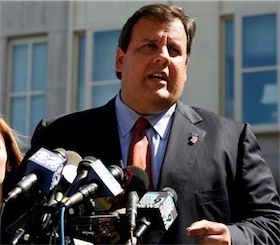
Something I've been wondering about throughout the Wisconsin standoff is whether curbing collective bargaining rights will really have the kind of results conservatives hope for. When I think back to the Fenty/Rhee days in DC it seemed to me that the collective bargaining process was mostly a way for a reform-oriented chancellor to bypass a much more union-friendly city council. Of course in the end the Washington Teachers Union had the last laugh, but that's because Fenty couldn't get himself re-elected not because he was symied via collective bargaining.
I'm interested to learn that Chris Christie sees it my way:
"Let me at them," he said, The Associated Press reported. "Get me out of the cage and let me go." A Christie spokesman said his administration has reached out to all the state's major unions to schedule initial meetings with them.
If anything, Christie said, he'd like to see collective bargaining become a bigger part of how the state negotiates pay and benefits for its employees. "I've said let's get rid of civil service and let everything be collectively bargained, as long as collective bargaining is fair, tough, adversarial and there's someone in that room representing you," he said.
And of course that makes sense for him. Christie is a conservative Republican in a state that's not conservative and that doesn't elect many Republicans. The state legislature is full of Democrats. What Christie wants is to maximize what can be achieved mano-a-mano and then try to win re-election in 2013. Of course, given the strong public opposition to stripping Wisconsin public workers of their collective bargaining rights, it also makes sense for a politician in the more-liberal New Jersey to try to take a more moderate tack. But Christie likes to pick fights, so I think there's probably some real wisdom in his disinclination to pick this one.


Matthew Yglesias's Blog
- Matthew Yglesias's profile
- 72 followers



